An Incomplete Guide To Kayaking: Part 3
Posted on | April 21, 2008 at 10:37 am | Comments Off
This is a continuation of my series of blog entries on the Dutch progressive rock band Kayak.
Phase 2: Prog Pop (1975-1977)
The Last Encore
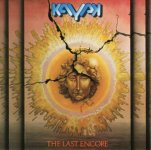 Kayak’s fourth album featured the same lineup as the third one and built on Royal Bed Bouncer, further refining their prog pop or “symphonic rock” sound.
Kayak’s fourth album featured the same lineup as the third one and built on Royal Bed Bouncer, further refining their prog pop or “symphonic rock” sound.
But change was in the offing, as the title suggests. This was to be their last album (for quite some time) with original drummer/co-songwriter Pim Koopman. Koopman has a lot of interesting stuff on this album, so he went out with style. He wrote half of the twelve songs on the disc, far more than on any other album. (The rest were written by Ton Scherpenzeel, as usual.)
I’m going to run down the songs in the order from the CD I have. The original LP had them in a different order.
The first song is “Back To The Front”, which is really two songs in one (the other should be called “We’ve Only Just Begun”). The first half is a melancholy, slower number that seems to be equating relationships to war. The tempo speeds up for the second half, when apparently the protagonist is in a happier mood, ending the song with “It’s only love making me feel we’ve only just begun”. Johan Slager’s electric guitar work makes the song(s) more interesting than it deserves to be, though it’s not without some vocal hooks.
Next is “Nothingness”, a ballad that prominently features a slow instrumental section with some wordless layered harmony vocal crooning followed by some complicated piano and string work.
The third song is Koopman’s stellar “Love Of A Victim”, one of my all-time favorite Kayak songs and one that is very atypical. The tempo is fast – really fast, and the song is short. It’s an unabashed rocker about loving the wrong person. Extra points for the weird treated piano sound in the break followed by the guitar solo. It’s good to see that Max Werner has the vocal chops to handle this sort of thing, though his high, thiny voice definitely give it a unique feel.
Song #4 is Koopman’s ballad “Land On The Water”, a lovely little song:
The God of Mediocrity is waiting for a lift
May he think his blindness is a gift
This is another song with a catchy break that sounds like it’s from a different song.
I don’t want to gather knowledge, if it’s second-hand
Think I’ll just retire on my land
The thrust of the lyrical sentiments in the song seem to presage Koopman’s retirement from the band. He just wants to get back to his land on the water!
Next is the title song, “The Last Encore”. It follows the usual Kayak formula of starting off as a vocal/piano ballad and gradually bringing in more instruments. Catchy chorus. The outro is too long and dull though.
Then we get another Koopman uptempo number, “Do You Care?”. I like this one quite a bit. Again, the lyrics seem to foretell his imminent exit from the band:
Do you care, really care if I say
What it takes, to convince me to stay
Guess I’m knowing it’s all worthwhile
But the habit’s beyond the smile
When you get to the top
Who’s the first one to drop
By that time I just might have gone crazy
Really nice guitar work by Slager in this one, as usual.
Song #7 is a Koopman relationship tune called “Still My Heart Cries For You”. It’s basically a ballad surrounding an intense fast-tempo catchy middle section. I like this one a lot, it uses my favorite Kayak formula.
Then there is “Relics From A Distant Age”, a showcase for Ton’s piano playing. It’s the longest song of the album and harkens back to more proggier times. Still, it’s a pretty song with some nice vocals. “Love Me Tonight/Get On Board” is a bit of Kayak curio. It’s a short double novelty song, intentionally sounding like something from the age of 78s. It’s a nice song to put on a mix tape and freak people out. “Evocation”, the second-to-last Koopman number is another ballad with intricate layered vocal tricks and some bursts of energy. I can never remember what this song sounds like unless I’ve just listened to it. Then there’s “Raid Your Own House”, Ton’s guitar-based rocker on the album. Nice vocal gymnastics by Max on this one. Ending the album is Koopman’s farewell, “Well Done”. It’s a short song, less than a minute long. Strings, piano, vocals – you know the score.
Favorite Songs: Love Of A Victim, Still My Heart Cries For You, Land On The Water, Do You Care?
Pim Koopman rejoined the band when they reunited in 2000 and has been with them ever since. His songwriting contributions to the post-reformation albums have been one of the best things about the Phase 4 version of the band. Although I have to say that Ton did a good job taking over pretty much sole songwriting duties (along with his wife Irene Linders on lyrics) in the intervening years. I think the absence of Koopman really pushed him to get his game on.
But we’ll get to that soon.
Next: Starlight Dancer. Disco Prog!
Latre.
An Incomplete Guide To Kayaking: Part 2
Posted on | April 20, 2008 at 12:08 pm | Comments Off
This is a continuation of my series of blog entries on the Dutch progressive rock band Kayak.
Phase 2: Prog Pop (1975-1977)
Royal Bed Bouncer
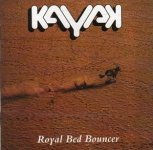 The first album in Kayak Phase 2, which I call their “Prog Pop” phase was their third album overall, Royal Bed Bouncer. The band lineup was pretty much the same as on the previous two albums, the only difference being the replacement of Cees van Leeuwen on bass with Bert Veldkamp. (Kayak has gone through a lot of bass players, and I’m probably not going to mention whenever there’s a new one.)
The first album in Kayak Phase 2, which I call their “Prog Pop” phase was their third album overall, Royal Bed Bouncer. The band lineup was pretty much the same as on the previous two albums, the only difference being the replacement of Cees van Leeuwen on bass with Bert Veldkamp. (Kayak has gone through a lot of bass players, and I’m probably not going to mention whenever there’s a new one.)
Even though the lineup didn’t change much, the music underwent a drastic shift in direction. The tracks were now shorter, punchier, and poppier, and they were songs. Max Werner grew into his own as a vocalist and his voice now started to match the material. Ton’s piano, always an integral part of the Kayak sound, also came into its own and gave a wide-stage dimension to the ballads as well as the rockers. Best of all, there’s some gorgeous melodies and catchy hooks.
The leadoff/title track “Royal Bed Bouncer” starts things off in an appropriately bouncy fashion, telling the fast-paced tale of a man with a strange occupation:
Who’s gotta bounce on his bed each night?
Looking for knives or some dynamite?
Only me – royal bed bouncer
Royal, royal bed bouncer
It’s a fast tempo song with at least three major hooks. And some hokey background vocals with the band saying “Royyyyal?” and laughing. It’s a good way to start off the album. Cool piano solo too.
“Life of Gold” follows – it starts off as a pretty solo piano/vocal ballad and then balloons up into a hook-filled showcase as more and more instruments are added to the mix. “Only you by my side…”
“You’re So Bizarre” is kind of a waltz, complete with trumpets. Again, it brings the hooks. Next is “Bury The World” which reminds me most of the kind of thing that appeared on the first two more-proggy albums. It’s a bit slow and unfocused for me, though the guitar riff is kind of nice.
“Chance For A Lifetime” was the biggest hit from the album. It has the Kayakians burrowing into some light-hearted science fiction territory with the story of a spaceship leaving Earth carrying the last survivors of a dying planet. I’m not being saracastic about the light-heartedness:
I’ll be your captain leader hero saint guide and king
The one who had this brilliant idea
I’ll be happy to accept all medals
For having saved all millions following me
We’ll sail the second Ark, tickets are cheap
You can alway choose a window seat if you wish
Let other people snicker, silly fools
When they come to grip with nature’s rules
We’ll be gone
Max Werner sings all this with the perfect mixture of gravity and silliness. This song is the first one that hits the Kayak formula that I most love. It’s fast-paced and starts out with a raucous synth riff that triggers all those endorphins in my brain. The guitar really comes into its own here – tasty fills and leads. And there’s a proggy instrumental section with harpischords and shit. This is Kayak playing to its strengths. It also shows how integral a part guitarist Johan Slager is, even when the guitar is not out in front. He’s a tasteful player who really rocks out when he needs to, and is the epitome of the “Kayak sound”.
“If This Is Your Welcome” starts off fast with a guitar solo playing over a bed of piano. And then it calms down into something of a ballad for the vocal sections. Inspired drumming and some melodic vocal hooks, especially in the break:
Long ago I held the key to your hearts and broke them all
I had the energy, time was on my side
Could I foresee I’d need you so?
It’s a melancholy song but I like it a lot.
“Moments of Joy” is another song that starts off as a ballad with a nice piano hook and then adds more instruments. The vocal line follows the piano notes a little too closely, which makes me lose some interest. The repeated piano hook in the outro salvages the song a lot. “Patricia Anglaia” is a short “instrumental” that starts off with some wordless vocals and pianos. Sounds like something you’d hear at a Parisian cafe.
“Said No Word” is the longest song on the album and has a lot of proggy touches to it, especially the instrumental section that starts off the song and repeats occasionally during it. It’s a decent melding of the pop/prog sides of the band, but it doesn’t have the hooks that some of the other songs have. Those instrumental sections are cool though.
“My Heart Never Changed” ends the album proper on another ballad-y note. It’s a short song with solo piano at the beginning. No drums or guitars on this one, but lots of strings and synths and woodwinds and plaintive vocals. It ends the album on a very low-key, depressing note.
As I said before, the CD contains a number of bonus tracks, most of which were songs from the first two albums. However, there’s also a weird little b-side called “Give It A Name”, which has a lot of talking, and what singing there is doesn’t sound like Max. In the liner notes, Ton says “The b-side Give It A Name is a joke, really. In it, we ridiculized the way many critics write their reviews – we got our fair share of that”. The music is quirky but not real interesting. For completists only.
There’s also a demo of an instrumental song called “Bulldozer” which has some nice riffs but is ultimately forgettable.
Favorite Songs: Chance For A Lifetime, If This Is Your Welcome, Royal Bed Bouncer, Life Of Gold, You’re So Bizarre.
Next: Phase 2, Part 2: The Last Encore.
Latre.
An Incomplete Guide To Kayaking: Part 1
Posted on | April 19, 2008 at 1:27 am | Comments Off
This is a continuation of my series of blog entries on the Dutch progressive rock band Kayak.
Phase 1: The Prog Years (1973-1974)
See See The Sun
Kayak (II)
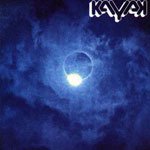 Kayak’s first album See See The Sun came out in 1973. Like it’s 1974 followup, Kayak (aka Kayak II), it’s pretty much a pure prog affair, though most of the songs aren’t too long, as you usually find in this genre. The young band originally consisted of Ton Scherpenzeel (keyboards), Max Werner (vocals), Pim Koopman (drums), Johan Slager (guitar) and Cees van Leeuwen (bass). Those first two albums produced a few hit singles in Holland and Europe, but probably didn’t get them much attention outside of that.
Kayak’s first album See See The Sun came out in 1973. Like it’s 1974 followup, Kayak (aka Kayak II), it’s pretty much a pure prog affair, though most of the songs aren’t too long, as you usually find in this genre. The young band originally consisted of Ton Scherpenzeel (keyboards), Max Werner (vocals), Pim Koopman (drums), Johan Slager (guitar) and Cees van Leeuwen (bass). Those first two albums produced a few hit singles in Holland and Europe, but probably didn’t get them much attention outside of that.
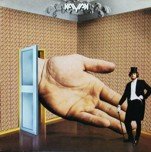 Unfortunately, there’s not much I can say about Kayak’s first two albums from a first person perspective, since I don’t have them on CD. I do have See See The Sun on vinyl (found in a used record store back in the early 80s), but I never liked it enough to even commit it to tape. However, the CD release of their third album Royal Bed Bouncer does feature many songs from those albums as bonus tracks. So, I did get a pretty good handle on what they sound like from that sampling. The critics who say they were trying to ape the British prog rock group Yes are pretty much on the money. The songs are interesting in their own way, but don’t really have the riffs and hooks and melodies that are evident on later efforts, and are frequently too slow-tempo. Max Werner’s vocals on these albums are especially annoying to me, though he eventually turned into my favorite Kayak vocalist on the subsequent albums. I think the problem is primarily that his vocal style does not fit the musical style they are attempting here.
Unfortunately, there’s not much I can say about Kayak’s first two albums from a first person perspective, since I don’t have them on CD. I do have See See The Sun on vinyl (found in a used record store back in the early 80s), but I never liked it enough to even commit it to tape. However, the CD release of their third album Royal Bed Bouncer does feature many songs from those albums as bonus tracks. So, I did get a pretty good handle on what they sound like from that sampling. The critics who say they were trying to ape the British prog rock group Yes are pretty much on the money. The songs are interesting in their own way, but don’t really have the riffs and hooks and melodies that are evident on later efforts, and are frequently too slow-tempo. Max Werner’s vocals on these albums are especially annoying to me, though he eventually turned into my favorite Kayak vocalist on the subsequent albums. I think the problem is primarily that his vocal style does not fit the musical style they are attempting here.
One of the problems that I and others have with prog rock is that it’s just so schizophrenic and not really “song-based”. There’s a lot of tempo and style changes within a song that make it hard to focus on the song as a discrete entity. What I’ve heard, and what I can remember, from these two albums certainly reinforce that opinion in me. They sound too monotonous. That said, I think the song “Alibi” (from Kayak II) does have some energy and catchiness to it, and would certainly rank it higher than some of their latter material. But for the most part, I don’t find these albums essential listening.
Next: Kayak finds its way.
Latre.
An Incomplete Guide To Kayaking: Introduction
Posted on | April 18, 2008 at 8:12 am | 1 Comment
It’s time for another look down the progressive rock history lane, since the Mike Oldfield post was such a smash. Even though I’m really not much of a prog rock fan, when you get right down to it.
Around the beginning of this year, I got a hankering to re-listen to all my CDs by the palindromic Dutch progressive rock band Kayak. And I thought, “Hey! Reviewing their albums would make a good set of blog entries for when times are slow!” Since Kayak is somewhat obscure on this side of the ocean (and maybe the other as well) and broke up in 1982, I figured this was ground that hadn’t been well covered.
But then a funny thing happened. In the course of researching the band, I discovered that they had reunited in the year 2000 and had quite a prolific string of albums since then. I love the Internet. How did I miss that? So then proceeded a mad scramble to get my hands on the CDs they’ve made since their reformation. Not an easy task, since they’re only available as expensive, and sometimes hard-to-find, imports. Those releases included three studio albums, one extended remake of an earlier studio album, one live album, one live acoustic album, and one double album recording of an original rock opera stage show (which I assume was recorded live, but I don’t have it, so I’m not sure). And oh yeah, there’s also a single album compilation of the tunes from that last one available. So that makes something like eight albums since 2000. And a DVD.
I did manage to get my hands on most of them, but a few are still alluding me and my budget. In addition, I never did get their first two albums on CD, though I do have one of them on vinyl somewhere in the garage. So, that’s why this is an incomplete guide. Rather than wait until I had the complete Kayak collection, I figure I have enough information now to write with some authority on their catalog.
So, first, a little background on the band and my attachment to them. Kayak is an odd band. They hail from Holland yet sing in English and sound like a British rock band. There are some strange things in the band’s history, like they’re the only band I can think of where the lead singer vacated the frontman position in favor of sitting behind the drum kit, rather than the other way around. They have been through many stylistic phases and lineup changes in their career. I have, somewhat arbitrarily categorized these phases thusly:
Kayak Phase 1: Prog Rock (1973-1974)
Kayak Phase 2: Prog Pop (1975-1977)
Kayak Phase 3: Pop Prog (1978-1981)
Kayak Phase 4: Rock Opera Pop (2000-present day)
The main constant in the lineup over the years is keyboardist/songwriter Ton Scherpenzeel, who has been in every incarnation of the group and is its guiding light. After the band went on their almost 20-year hiatus in 1982, he joined the group Camel for awhile, another of the progressive rock bands that I like.
The band’s biggest US hit was “Want You To Be Mine” from Starlight Dancer (Billboard #55), which was a strange chunk of… I’m gonna call it “Disco Prog”. But more on that later. The band’s biggest international hit was “Ruthless Queen” from Phantom of the Night, which seems to be pretty popular everywhere but here. The band is probably best known in the US for a hit from one of its “sub-bands”. Two current Kayak members were the main guys in the band Diesel, which had a #25 Billboard hit in 1981 with the song “Sausalito Summernight”, a quintessentially (and great) American-sounding song from these Dutch Masters. But I’m not going to get into that.
Lyrically, the band does not delve into fantasy as much as you’d think, or as much as other prog rock bands. Most of the songs have to do with (horrors) human relationships. Though they do get into historical epics, mythology, and the occasional science fictional ditty.
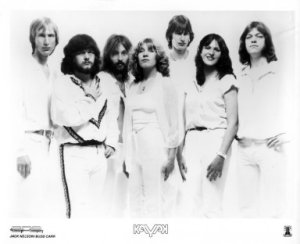 I discovered the group right at the beginning of Phase 3: Pop Prog. The album Phantom Of The Night (from which the band photo at right comes from) had just come out. I heard the poppy single “Keep The Change” on the legendary KFML and knew I had to check out the band. I bought the album and found the whole thing to be a pleasantly entertaining affair with sparks of genius here and there. When I eventually mentioned the band to DJ Smallberries, he brought out his pre-Phantom of the Night Kayak albums for me to listen to, and I liked them even better. For awhile, the band was probably one of my top-ten favorite bands, and I listened to them quite a lot when I was in college. Not so much after they broke up, although I was still into them enough to track down what CDs I could find when they’re catalog started getting released digitally.
I discovered the group right at the beginning of Phase 3: Pop Prog. The album Phantom Of The Night (from which the band photo at right comes from) had just come out. I heard the poppy single “Keep The Change” on the legendary KFML and knew I had to check out the band. I bought the album and found the whole thing to be a pleasantly entertaining affair with sparks of genius here and there. When I eventually mentioned the band to DJ Smallberries, he brought out his pre-Phantom of the Night Kayak albums for me to listen to, and I liked them even better. For awhile, the band was probably one of my top-ten favorite bands, and I listened to them quite a lot when I was in college. Not so much after they broke up, although I was still into them enough to track down what CDs I could find when they’re catalog started getting released digitally.
In subsequent entries, I will go into more detail about the albums and the phases and the strange history of the band. But for now, I suggest checking out the English language version of the band’s official website. The blog entries are especially interesting (there’s not a lot of them) as are the photos of the band throughout the ages. The band also has the de rigueur MySpace page, though I’m pretty sure that the tunes offered up for sale there under the Snocap area are for a different band called Kayak. So… um…. buyer beware.
Next: The Prog Phase.
Vaarwel voor nu.
Hollow Fans
Posted on | April 17, 2008 at 7:14 am | Comments Off
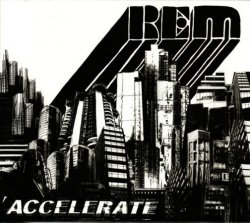 I finally got a chance to listen to the new R.E.M. album Accelerate in its entirety. I’ve only listened to the whole thing once so far, but I have to say it’s their best since… oh… Out of Time. (I’m not a fan of Automatic for the People – it puts me to sleep.)
I finally got a chance to listen to the new R.E.M. album Accelerate in its entirety. I’ve only listened to the whole thing once so far, but I have to say it’s their best since… oh… Out of Time. (I’m not a fan of Automatic for the People – it puts me to sleep.)
What gets me is all these fans who are saying, “Yeah, it’s kind of a return to form, but it really peters out after the first three songs.” Huh? It’s chock full of good songs. Yeah, those first three are really good (especially “Man-Sized Wreath”), but I would put the title song “Accelerate” right up there with them. It does start to drag a little bit in the second half, and there’s maybe one too many waltzes, but…
My God! The energy is back! The band is playing like they’re excited! The hooks and melodies and background vocals are back! I kept noticing little things, like those guitar bursts on “Houston” and the interesting bass playing on “Sing for the Submarine”. I never thought I’d get excited about an R.E.M. album again, especially after After The Sun. Their last “rock” album, Monster, was pretty tedious – all the songs sounded the same and lacked hooks. That’s not a problem here. This is getting me moving.
Best of all, the album works as a whole and I can’t see myself skipping over tracks (yet). It was really good decision to keep the album short – 11 songs in 35 minutes. If there were any padding like there has been on their longer albums, my reaction wouldn’t be as favorable.
Good going guys, you actually sound like a band again. I hope it’s not just a one-off.
Latre.
Do the Real Math
Posted on | April 16, 2008 at 7:30 pm | 2 Comments
This news saddens me: Amazon DRM-Free Music Has Little Impact On Apple iTunes. I guess people just don’t care about DRM-Free music.
“DRM stands for ‘doesn’t really matter,’ ” Crupnick said. “The vast majority of people don’t experience DRM [problems]. The iPod and iTunes work great together, so none of that really bothers consumers that much.”
That’s all fine and dandy now, but what happens when people want to put their songs on some non-Apple player? Or they go through more than five computers? Or experience any of the other headaches that DRM can cause? Then they’ll learn.
I’m much more inclined to use Amazon these days, not just for the DRM-Free files, but also because they’re often cheaper. Yeah, their selection isn’t as good, but it’s getting better.
I don’t think the market has finished speaking yet though. Amazon hasn’t been in this biz for long. Let’s see how it plays out over the long run.
Latre.
Jogged Today: Yes (@ 43°F)
Songs That Came Up On The iPod While Jogging:
- “Believe That I Understand” (Magazine)
- “Autumn Soon” (The Church)
- “Silver” (Echo & the Bunnymen)
- “Unzip” (Cinerama)
- “Hammer Back” (Blue Öyster Cult)
- “Sign The Air” (From Bubblegum To Sky)

|
Pet Peeve of the Day: Snow in April, one day after the temp was in the 80s. |
Poignant Search Term Of The Day That Led To This Blog: “phobia fear of unattached hair”.
Favorite Search Term Of The Day That Led To This Blog: “proper way to end a conversation”.